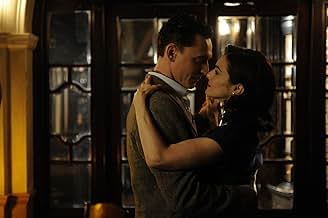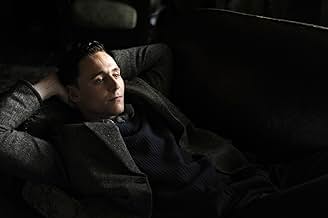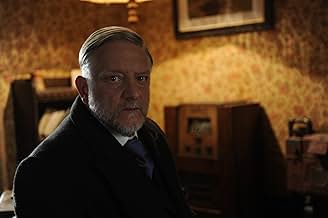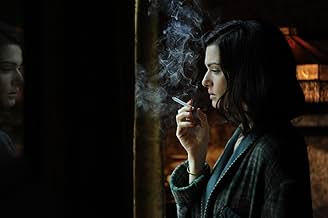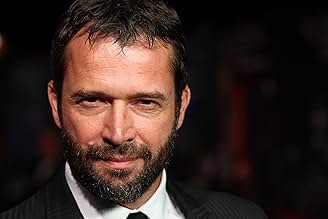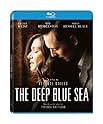IMDb-BEWERTUNG
6,2/10
17.191
IHRE BEWERTUNG
Die Frau eines britischen Richters findet sich in einer selbstzerstörerischen Liebesbeziehung mit einem Piloten der Royal Air Force wieder.Die Frau eines britischen Richters findet sich in einer selbstzerstörerischen Liebesbeziehung mit einem Piloten der Royal Air Force wieder.Die Frau eines britischen Richters findet sich in einer selbstzerstörerischen Liebesbeziehung mit einem Piloten der Royal Air Force wieder.
- Regie
- Drehbuch
- Hauptbesetzung
- Auszeichnungen
- 5 Gewinne & 13 Nominierungen insgesamt
Jorge Ojeda-Dávila
- Man in Bunker Bed
- (Nicht genannt)
Owen Thomas
- Caretaker
- (Nicht genannt)
Empfohlene Bewertungen
i saw this with twenty something people. This was not a movie for them, but it is a most superior film for older people who have seen people live torturous lives. Why people do things that hurt themselves is a intriguing question which fascinates psychologists and artists alike. No one has come up with a satisfactory answer, not even a plausible one, and Freud leads the list of the clueless. Thus, Hester (played by a wonderful Rachel Weisz) can fascinate those of us who care about the inner working and emotional vicissitudes of a self destructive woman and who will learn about the human condition by considering her behavior. Simon Beale and Tom Hiddleston, the men in her life, are equally impressive performers playing equally limited (Beale) and troubled (Hiddleston) persons.
First, I think most people don't know where the title comes from. A song popular during the second world war (a recent event in this film), has the line "we're caught between perdition and the deep blue sea." This is an apt description of the three protagonists.
This film might be quite tedious for those in a hurry to move on with their lives. The three main characters are stuck and seem to have no capacity for getting unstuck. This is tough to contemplate if you can't wait for your tomorrow's great triumph, or if you see romance as a smooth road to your personal paradise.
The rest of us are mesmerized as these troubled lives unfold on screen. Yes, the mood and physical atmosphere are almost relentlessly dark (it needn't have been); The film is completely without humor, and it is much too slow moving. These are minor difficulties. The script and performances are magnificent.
First, I think most people don't know where the title comes from. A song popular during the second world war (a recent event in this film), has the line "we're caught between perdition and the deep blue sea." This is an apt description of the three protagonists.
This film might be quite tedious for those in a hurry to move on with their lives. The three main characters are stuck and seem to have no capacity for getting unstuck. This is tough to contemplate if you can't wait for your tomorrow's great triumph, or if you see romance as a smooth road to your personal paradise.
The rest of us are mesmerized as these troubled lives unfold on screen. Yes, the mood and physical atmosphere are almost relentlessly dark (it needn't have been); The film is completely without humor, and it is much too slow moving. These are minor difficulties. The script and performances are magnificent.
Overindulgent and somewhat stuffy romantic drama that is saved single handedly by the Oscar caliber performance of Rachel Weisz, who gives a very complex and realistic look at a women whose self destructing over her choices in life in post war Britain in the 1950's. Weisz so good that she brings a lot of life into a somewhat lifeless screenplay that is more into atmosphere than substance. Both of her leading men are fine and lent great support to the vibrant Weisz, who is keeping this film afloat almost by herself while the movie gets a bit claustrophobic towards its climax. The film does have some great moments ( The pub scene and the intimate moment between Weisz and leading man Tom Hiddleston while dancing) but that's more the credit to Weisz and the cast than the film itself. Rachel Weisz has always been one of the most gifted and versatile actresses working today, not being afraid to do different characters and being unlikeable and raw in the process. In this film, she gives in my opinion the best female acting performance in the last few years, giving a complex and rich performance with a character that could have easily been botch by even a great actress, especially with a screenplay that is more into itself than the audience watching the movie. Weisz proves in this movie that she's more than a great actress, she proves that she is one of the best actresses we ever had.
Her phenomenal performance alone is the real reason to see this movie.
Her phenomenal performance alone is the real reason to see this movie.
The Deep Blue Sea is a period romance focusing on Hester (Rachel Weisz), the wife of a judge who embarks on an affair with the reckless RAF pilot Freddie (Tom Hiddleston). However, overcome with a mixture of guilt and disappointment that her new life isn't quite what she'd hoped, she makes a dramatic decision which has disastrous consequences for herself and her relationships.
This film has quite a poignant story – it focuses a lot on emotion and doubt which are highly relatable even outwith the situation of the story itself. The period setting gives it a somehow more romantic edge and it really is an interesting love story. You can't help but understand the problems that Hester experiences with her troubled life, and the "grass is greener" feeling that draws her towards a seemingly more exciting life with Freddie. The story ebbs and flows in parallel with Hester's feelings, and at times takes some dark turns. Despite the story being good, I felt really let down by the direction – the scenes constantly switch between present day and very recent flashbacks with little discerning detail as to which is which. I found myself lost at many points during the film, unable to work out where it was in the story and having to rely on the odd bit of choice dialogue that would reveal the time setting. This is sadly very off-putting and took away from the punch that the script would have had otherwise.
Despite the scene confusions, Weisz and Hiddleston offer a beautiful, if difficult, romance that is really set alive by the strengths of them as actors. Weisz is on top form with a powerful but vulnerable performance, and Hiddleston suits the role of the troubled romantic (his character in this reminded me a lot of his role in "Only Lovers Left Alive" (2014) in which he was incredible). There was also good performances from smaller characters, most notably Hester's husband Sir William (Simon Russell Beale) who's role was vulnerable and gentle, an opposite to the rival of his wife's affections.
The Deep Blue Sea is quite a powerful and interesting love story, but sadly I felt that the possibility of this film being a great classic romance was tarnished somewhat by the lack of clarity in time shifts. Nevertheless, the story is good and it's worth a watch for the excellent characters and script.
This film has quite a poignant story – it focuses a lot on emotion and doubt which are highly relatable even outwith the situation of the story itself. The period setting gives it a somehow more romantic edge and it really is an interesting love story. You can't help but understand the problems that Hester experiences with her troubled life, and the "grass is greener" feeling that draws her towards a seemingly more exciting life with Freddie. The story ebbs and flows in parallel with Hester's feelings, and at times takes some dark turns. Despite the story being good, I felt really let down by the direction – the scenes constantly switch between present day and very recent flashbacks with little discerning detail as to which is which. I found myself lost at many points during the film, unable to work out where it was in the story and having to rely on the odd bit of choice dialogue that would reveal the time setting. This is sadly very off-putting and took away from the punch that the script would have had otherwise.
Despite the scene confusions, Weisz and Hiddleston offer a beautiful, if difficult, romance that is really set alive by the strengths of them as actors. Weisz is on top form with a powerful but vulnerable performance, and Hiddleston suits the role of the troubled romantic (his character in this reminded me a lot of his role in "Only Lovers Left Alive" (2014) in which he was incredible). There was also good performances from smaller characters, most notably Hester's husband Sir William (Simon Russell Beale) who's role was vulnerable and gentle, an opposite to the rival of his wife's affections.
The Deep Blue Sea is quite a powerful and interesting love story, but sadly I felt that the possibility of this film being a great classic romance was tarnished somewhat by the lack of clarity in time shifts. Nevertheless, the story is good and it's worth a watch for the excellent characters and script.
"Love, that's all." (Hester responds to her husband when he asks her what happened.)
No film in recent memory is as depressing as The Deep Blue Sea, Terence Davies' adaptation of Terence Rattigan's play. In either venue, the story of Lady Hester Collyer (Rachel Weisz) and her infidelity will sear your brain in recognition of the perfect storm of love and lust sung to the tune of 1950's conservatism, which largely meant staying with a spouse regardless if it's a loveless marriage.
Freddie (Tom Hiddleston), a WWII Brit flyboy, hasn't graduated yet from the romance of that war to the responsibilities of true love in civilian life. Hester unfortunately is ripe for romance with him as her older husband, a high court judge and a peer, is caring but far too reserved to provide a tender woman with the love she needs.
This is a simple film of measured speech in the tradition of West End thespian greatness. Unlike the orderly upper class, love is not simple but rather messy. In the claustrophobia of her apartments, either beautifully appointed with Sir William Collyer (Simon Russell Beale) or bare with Freddie, Hester is always waiting, either for her husband to love her or her lover to stay with her. Ironically Sir William is waiting, too, with love taking its measure of despair from those who love. As for charming Freddie, he is exuberant, careless, and destructfully self-centered.
Davies and Rattigan intercut between times to make The Deep Blue Sea seem just that: fragmented and deeply melancholic. Yet despite the incoherence, you'll not see a better acting trio this year. Where the play lacks vibrancy or heart, the actors give it their best.
When Freddie consoles Hester upon leaving her with this cliché, "Never too late to start again, isn't that what they say?" he is also hitting the center of her tragedy—she is so passive that this may be the first and last adventure she will ever have.
All that's left is the estranging deep blue sea:
Who ordered that their longing's fire Should be as soon as kindled, cooled?
Who renders vain their deep desire?
A God, a God their severance ruled!
And bade betwixt their shores to be The unplumbed salt, estranging sea.
Matthew Arnold, "To Marguerite—Continued"
No film in recent memory is as depressing as The Deep Blue Sea, Terence Davies' adaptation of Terence Rattigan's play. In either venue, the story of Lady Hester Collyer (Rachel Weisz) and her infidelity will sear your brain in recognition of the perfect storm of love and lust sung to the tune of 1950's conservatism, which largely meant staying with a spouse regardless if it's a loveless marriage.
Freddie (Tom Hiddleston), a WWII Brit flyboy, hasn't graduated yet from the romance of that war to the responsibilities of true love in civilian life. Hester unfortunately is ripe for romance with him as her older husband, a high court judge and a peer, is caring but far too reserved to provide a tender woman with the love she needs.
This is a simple film of measured speech in the tradition of West End thespian greatness. Unlike the orderly upper class, love is not simple but rather messy. In the claustrophobia of her apartments, either beautifully appointed with Sir William Collyer (Simon Russell Beale) or bare with Freddie, Hester is always waiting, either for her husband to love her or her lover to stay with her. Ironically Sir William is waiting, too, with love taking its measure of despair from those who love. As for charming Freddie, he is exuberant, careless, and destructfully self-centered.
Davies and Rattigan intercut between times to make The Deep Blue Sea seem just that: fragmented and deeply melancholic. Yet despite the incoherence, you'll not see a better acting trio this year. Where the play lacks vibrancy or heart, the actors give it their best.
When Freddie consoles Hester upon leaving her with this cliché, "Never too late to start again, isn't that what they say?" he is also hitting the center of her tragedy—she is so passive that this may be the first and last adventure she will ever have.
All that's left is the estranging deep blue sea:
Who ordered that their longing's fire Should be as soon as kindled, cooled?
Who renders vain their deep desire?
A God, a God their severance ruled!
And bade betwixt their shores to be The unplumbed salt, estranging sea.
Matthew Arnold, "To Marguerite—Continued"
I've been putting off review The Deep Blue Sea. Terrence Davies' remake of the 1950′s film based on the stage-play is a curious piece which I'm still struggling to get my head around.
It's a strangely polarising beast which split me between annoyance and er enjoyance
Here's the deal. On the one hand. It's a self-consciously old-fashioned portrayal of love and life in 1950′s London. Rachel Weiss plays Hester trapped in a flat and dull marriage she finds physical and emotional release in the arms of Freddie (played by Tom Hiddleston) a magnetic yet damaged WW2 pilot who is struggling to adjust to post-war life. The story is stylistic lavish with intimate set-pieces, evocative lighting and a mood of emotional frustration. What's not is as important as what is not said. There's evocations of Brief Encounter and Powell & Pressburger. An impressive meditation on love in all its forms and the damage it can cause.
On the other hand. It's an out-dated throw-back from a director who is stuck in time with a Britain that never really existed. Pampered hoity-toity, plummy-types (Hester? Freddie? Oh, 'k off!) moping and whining while the salt of the earth "Cor Blimey" types are just busy getting by. Posh types mope. Look out of windows. Smoke. Mope a bit more. Look out of more windows. Have a bit of a row. Cry. Look out of even more windows. Gah! Hester treats her husband like rubbish. Freddie treats Hester like rubbish. Hester treats herself like rubbish. It's so mannered and drenched in stylistic devices and cinematic tropes that they become at best distracting, at worst like a cinema school project with a budget.
So where does that leave us? Nostalgic meditation on love? Or stylised bore-fest of posh-types gagging for it? To be honest I'm still stuck between a rock and a hard place. Between, the devil and the . hmmm hang-on . it's suddenly occurred to me that maybe that's the point. Christ, I think I need to watch something stupid to clear my brain.
It's a strangely polarising beast which split me between annoyance and er enjoyance
Here's the deal. On the one hand. It's a self-consciously old-fashioned portrayal of love and life in 1950′s London. Rachel Weiss plays Hester trapped in a flat and dull marriage she finds physical and emotional release in the arms of Freddie (played by Tom Hiddleston) a magnetic yet damaged WW2 pilot who is struggling to adjust to post-war life. The story is stylistic lavish with intimate set-pieces, evocative lighting and a mood of emotional frustration. What's not is as important as what is not said. There's evocations of Brief Encounter and Powell & Pressburger. An impressive meditation on love in all its forms and the damage it can cause.
On the other hand. It's an out-dated throw-back from a director who is stuck in time with a Britain that never really existed. Pampered hoity-toity, plummy-types (Hester? Freddie? Oh, 'k off!) moping and whining while the salt of the earth "Cor Blimey" types are just busy getting by. Posh types mope. Look out of windows. Smoke. Mope a bit more. Look out of more windows. Have a bit of a row. Cry. Look out of even more windows. Gah! Hester treats her husband like rubbish. Freddie treats Hester like rubbish. Hester treats herself like rubbish. It's so mannered and drenched in stylistic devices and cinematic tropes that they become at best distracting, at worst like a cinema school project with a budget.
So where does that leave us? Nostalgic meditation on love? Or stylised bore-fest of posh-types gagging for it? To be honest I'm still stuck between a rock and a hard place. Between, the devil and the . hmmm hang-on . it's suddenly occurred to me that maybe that's the point. Christ, I think I need to watch something stupid to clear my brain.
Wusstest du schon
- WissenswertesTerence Davies wanted Rachel Weisz for the part of Hester Collyer after he noticed her "incredible talent" in Amy Foster - Im Meer der Gefühle (1997), even though he hadn't heard of her before seeing that film. He called his agent and asked, "Have you ever heard of this girl Rachel Weisz?" His agent laughed and said, "She's an Oscar winner!" Weisz was amused by this and said, "I don't think Terence [Davies] knows very well anyone who's not in a black and white film."
- Zitate
Freddie Page: Let me give you a case: Jack loves Jill, Jill loves Jack. But Jack doesn't love Jill in the same way. Jack never asked to be loved.
Hester Collyer: And what about Jill?
Freddie Page: That's Jill's hard luck! I can't be bloody Romeo all the time!
- VerbindungenFeatured in Maltin on Movies: The Watch (2012)
- SoundtracksConcerto for Violin and Ochestra, Op. 14
Composed by Samuel Barber
Published by G. Schirmer, Inc (ASCAP)
Performed by Hilary Hahn & The Saint Paul Chamber Orchestra
Conducted by Hugh Wolff
Licensed courtesy of Sony Music Entertainment Inc.
Top-Auswahl
Melde dich zum Bewerten an und greife auf die Watchlist für personalisierte Empfehlungen zu.
- How long is The Deep Blue Sea?Powered by Alexa
Details
- Erscheinungsdatum
- Herkunftsländer
- Offizieller Standort
- Sprache
- Auch bekannt als
- Dục Vọng Đàn Bà
- Drehorte
- Produktionsfirmen
- Weitere beteiligte Unternehmen bei IMDbPro anzeigen
Box Office
- Bruttoertrag in den USA und Kanada
- 1.126.525 $
- Eröffnungswochenende in den USA und in Kanada
- 123.841 $
- 25. März 2012
- Weltweiter Bruttoertrag
- 3.143.514 $
- Laufzeit
- 1 Std. 38 Min.(98 min)
- Farbe
- Sound-Mix
- Seitenverhältnis
- 1.85 : 1
Zu dieser Seite beitragen
Bearbeitung vorschlagen oder fehlenden Inhalt hinzufügen



